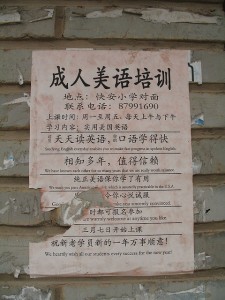A Guest Post by Steve Entrich, University of Potsdam, Germany:
What we are all well aware of is the fact, that shadow education institutions are established all over the world and seem to gain greater importance from year to year. The presented flyers show a typical side of these institutions: juku are also season oriented organizations, which aim to get more students especially while summer break.
I found another flyer in China, which represents a part of the private tutoring sector, that seems pretty dubious to me and shows that also just earning money is one of the reasons to run such a business:
The article related to this flyer is posted in the German online magazine concerned with themes all around Asia, the “Asienspiegel”:
http://asienspiegel.ch/2011/07/trugerische-nachhilfekurse/
The german article you will find when following the link posted above shows you a Chinese juku flyer that was especially printed for a English language course which is held during the summer holidays and addressed to primary and middle school students that aim to upgrade their English knowledge. At second thought you might think, maybe not the students themselves are meant but their parents, on whose worries the juku owners are taking advantage in order to earn some money.
The problems you will find here are the same ones we find in a lot of other countries too: there are no quality standards that define the teachers educational level. And if that isn’t enough, in this special case the juku owner seems to lie about the qualifications of their tutors and the outcomes of the received learning sessions. The price is also quite delicate: about 40000 Yuan (ca. 6272 US $) were paid by a chinese mother after visiting a trial lesson that in the end wasn’t comparable to the later received lessons.
Meanwhile the Peking administration for trade and industry – that has already created a bunch of hotlines for such cases – advises parents to report all malpractice of those institutions. But in the end parents can’t be protected of falling into numerous traps unscrupulous juku-owners had set for them. Like in many other states the education at juku-like institutions will remain in the shadow if the state itself doesn’t install legal regulations.


